The 4th IEEE International Conference on Cyborg and Bionic Systems (IEEE CBS2022) was held in Wuhan from March 24th to 26th. The conference was jointly initiated by Toshio Fukuda, foreign member of the Chinese Academy of Sciences, Professor Huang Qiang from the Beijing Institute of Technology, Professor Harry Asada from the Massachusetts Institute of Technology, and Professor Alois Knoll from the Technical University of Munich.
Bionic science explores the cross-fusion of biological and mechatronic systems for human well-being. The conference provided an international platform for researchers in this field to share insights and experiences. It was sponsored by the IEEE Robotics and Automation Society, and co-organized by HUST, Nagoya University (NU) and Wuhan Association of Automation (WAA). Experts and industry representatives from six countries gave keynote speeches and more than 100 delegates attended the conference on site.
Zhang Yao, Vice Chair of the University Committee from HUST, attended the opening ceremony and delivered a speech. Professor Yasuhisa Hasegawa, the Conference Chair for International Organizations from NU, gave a speech. Geng Yuanming, Chair of the School of Artificial Intelligence and Automation Committee, presided over the opening ceremony.
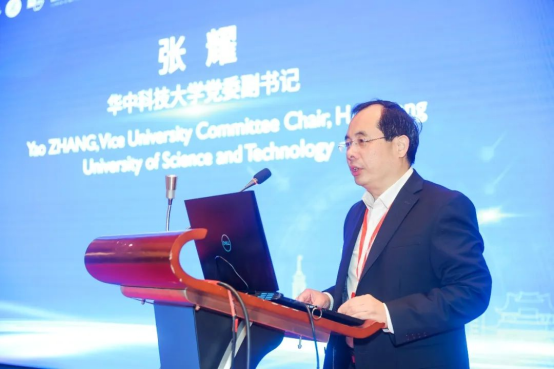
Vice Chair of the University Committee Zhang Yao giving a welcome speech
Zhang Yao stated that HUST is dedicated to leading-edge research and high-quality talent training in the field of bionic science, and that the university aims to develop practical applications for bionic science for the benefit of human well-being. In the future, the university hopes to collaborate with universities and institutes around the world in fields such as bionic intelligent robots and rehabilitation assisting robots, working together for mutual development.
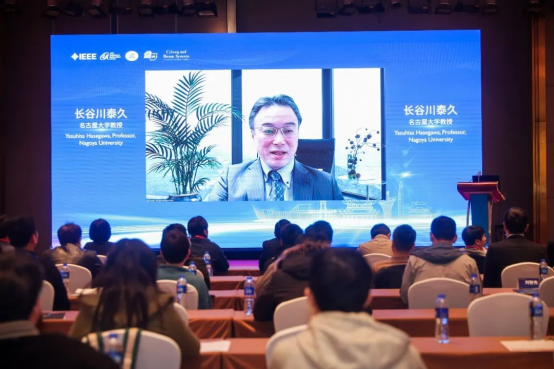
Professor Yasuhisa Hasegawa from Nagoya University giving a speech
Professor Yasuhisa Hasegawa expressed his gratitude to experts and scholars for supporting the conference. He emphasized that bionic technology is crucial for shaping the future of society and encouraged scholars at the conference to make use of this opportunity to exchange ideas and form collaborations to advance research in robotics and bionic systems.
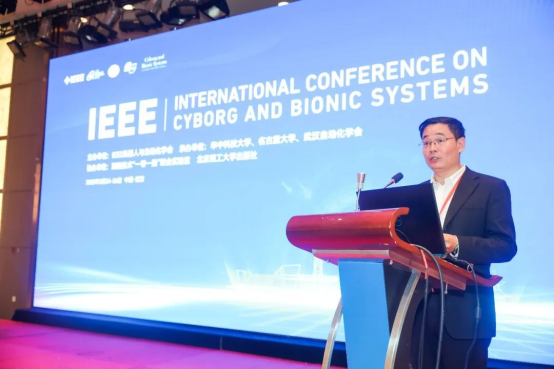
Geng Yuanming presiding over the opening ceremony
The conference featured presentation and keynote speech sessions in fifteen sub-venues across various fields. Experts, industry representatives and young scholars shared and discussed their latest scientific achievements. The conference also received 105 submissions from 9 countries and regions, and selected 10 finalists for four awards: Best Paper Award, Best Student Paper Award, Best Life-like Robot Paper Award and Best Bionic System Paper Award.

Professor Kay Chen Tan from PolyU giving a keynote speech
Professors gave keynote speeches at IEEE CBS2022, sharing their latest research achievements and insights on various topics related to robotics and automation.
Professor Kay Chen Tan from The Hong Kong Polytechnic University presented his work on "Learnable Evolutionary Algorithms for Complex Multi-objective Optimization", which are capable of solving challenging problems that involve multiple conflicting objectives and large-scale decision variables.
Professor Fumihito Arai from the University of Tokyo introduced his research on "Biorobotics Based on Micro-nanomechatronics for Biomedical Micro-nano Works", which apply micro-nano robotic technologies to perform various tasks in biological and medical fields. He showed some examples of robotic systems that can automate and evaluate biomedical micro-nano engineering.
Professor Li Zhijun from the University of Science and Technology of China described the principles and implementation schemes of wearable robotic cross-modal neural muscle interfaces that can enhance human motion and sensory functions. Professor Song Aiguo from Southeast University proposed a novel design for surface texture sensors that can mimic human active texture perception by touch. Professor Liu Xiuyun from Tianjin University shared her new understanding of clinical practice on neonatal intensive care.
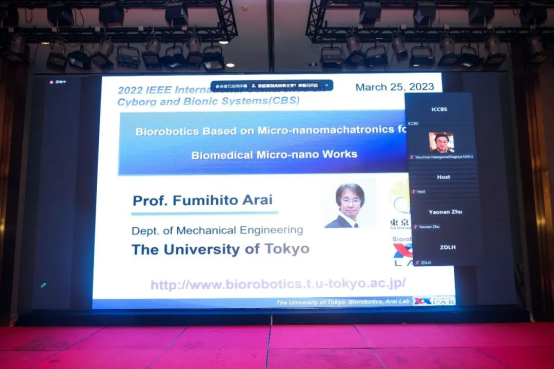
Professor Fumihito Arai from the University of Tokyo giving a keynote speech
At the closing ceremony, Professor Huang Jian, the conference chair and the professor from the School of Artificial Intelligence and Automation of HUST, gave a summary of the conference. The conference awards were presented. Professor Tatsuo Arai from the Beijing Institute of Technology and Professor Alvaro Rios Poveda from La Salle University in Mexico gave a preview of the 2023 CBS conference.
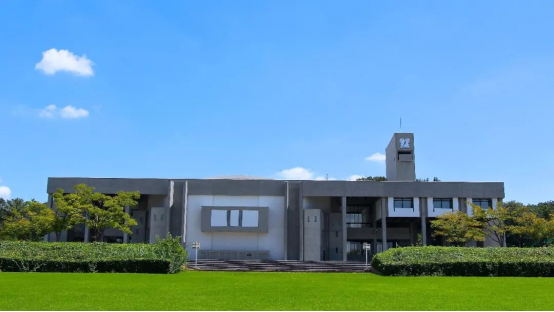
The conference is a partnership event between the School of Artificial Intelligence and Automation of HUST and Nagoya University. Nagoya University is a national research university in Japan boasting six Nobel laureates, two Japan International Prize winners and one Fields Medalist. The Graduate School of Engineering of Nagoya University is a partner of the School of Artificial Intelligence and Automation of HUST. The two sides have a solid partnership in research and will work together more closely on building disciplines, conducting studies and training talent in the future.
Written by: Hu Zhenxiang
Edited by: Chang Wen, Peng Yumeng
